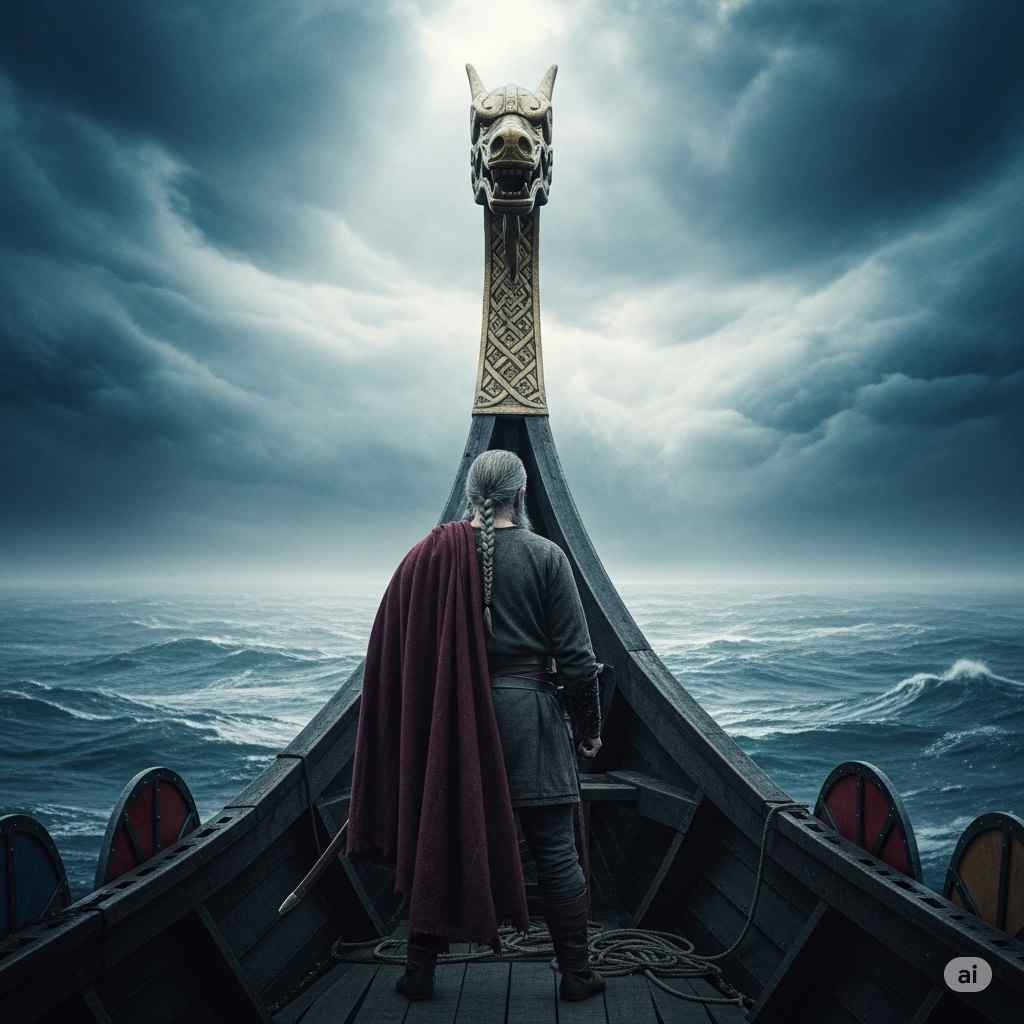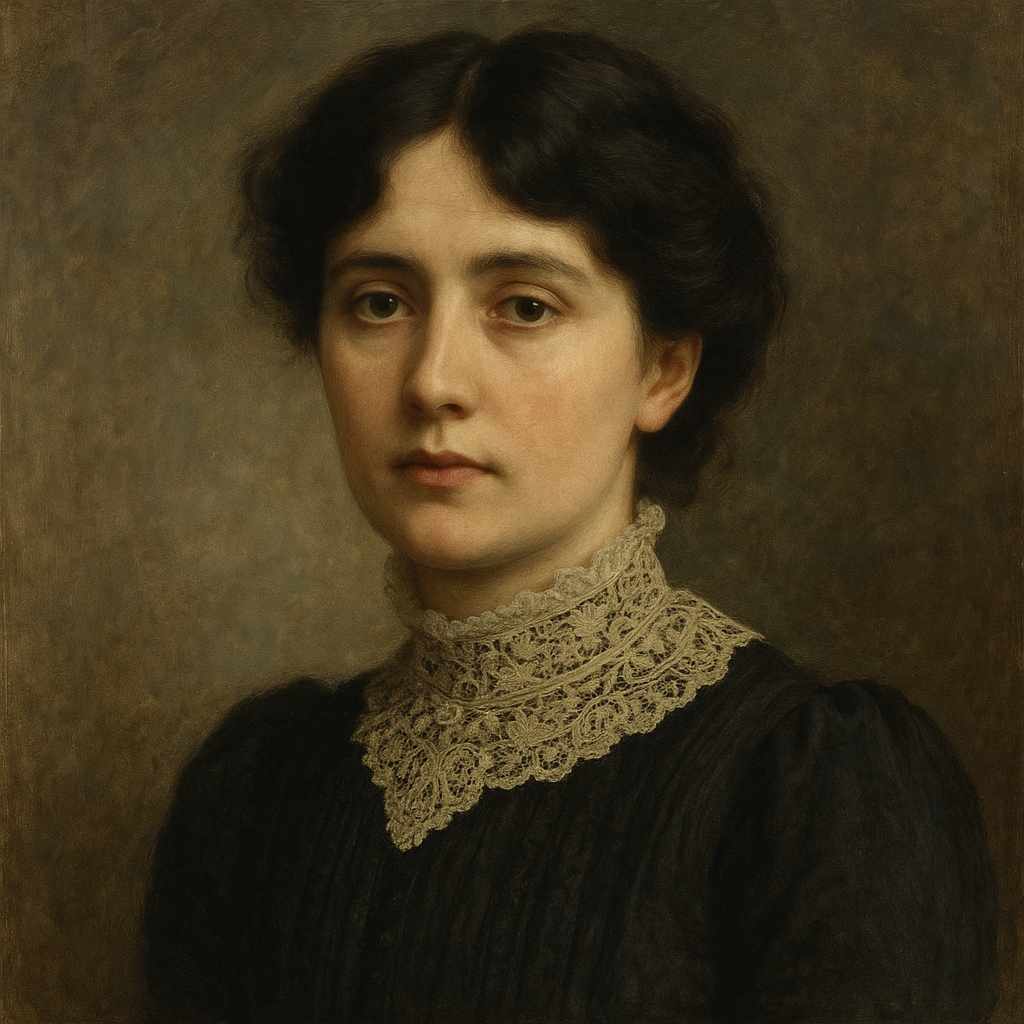The Last Viking
Nora Hopper Chesson
1871 to 1906

Row ye well; for my purpose stands,
And I am weary of meadowlands.
I'm sick of sowing and reaping folk,
Of arled herdsmen and beasts in yoke.
My arms are rusty, my silken gear
I've bartered for kisses not warm or dear;
The kisses fail me, my gold being spent,
And I go on the path the old gods went.
Oh, fair are the women of stead and town,
But softer heart 'neath a vadmal gown
Has beaten for me, and eyes more fair
Have smiled for me under unbound hair.
But it comes to me, as it comes to all,
That I am weary of folk in hall,
That laughter of women falls on my ear
As cold as the splatter of water clear.
It comes to me from the board to rise
As the old gods did, with unloving eyes,
When they sat at the feast and they drank brown ale,
And they heard the wind through a flapping sail.
And gold though the trees of Glasir stood,
And bold though the vaunt of the giant brood,
They passed from fray and they passed from feast,
And all the tale of their greatness ceased.
They were gods, but they knew what the strong sea says,
To men grown weary of easy days;
They were gods, and answered a dearer call
Than the voices of folk that loved them all.
What signs were set in the Norland sky
I know not. They followed, and so will I,
For portent above or for sign below
There's none will pause when the sea-winds blow.
We'll out and away on the calling sea,
And the wind shall take us where we would be,
Till we lose all knowledge of star or breeze,
And push our helm into shoreless seas,
Where the sleeping girth of the Midgards-orm
Lies round the earth, till the last great storm
Breaks on the homesteads, and faring-folk,
And the world grows dim towards Ragnarok.
Till the Twilight come, and our oar-blades fail,
On the outland seas we will set our sail,
And talk with the gods that we chance to meet
Of the voice that called to their wayward feet.
Though we met no gods and we saw no star,
And drifted, alive, where the dead seas are,
Yet our path were safer, our guide more kind
Than paths and voices we leave behind.
We are well away, and content were I
To sail for ever, and never die!
Nora Hopper Chesson's The Last Viking
Nora Hopper Chesson’s The Last Viking is a haunting meditation on existential weariness, the allure of myth, and the inexorable pull of destiny. Published in the late 19th or early 20th century, the poem engages with themes of cultural nostalgia, personal disillusionment, and the romanticized escape from modernity into the arms of mythic fatalism. Through its vivid imagery, allusions to Norse mythology, and introspective tone, the poem transcends mere historical pastiche and instead becomes a universal lament for lost vitality and purpose.
This essay will examine The Last Viking through multiple lenses: its historical and cultural context, its engagement with Norse mythology, its literary devices and structural choices, and its emotional resonance. Additionally, we will explore how the poem reflects broader fin-de-siècle anxieties about industrialization, spiritual malaise, and the search for meaning beyond the mundane.
Historical and Cultural Context: The Viking Revival and Fin-de-Siècle Disillusionment
The late 19th century saw a resurgence of interest in Viking culture, spurred by Romantic nationalism and a growing fascination with medievalism. Writers like William Morris and scholars such as Eiríkr Magnússon translated Old Norse sagas, while artists depicted Viking exploits with dramatic flair. This "Viking Revival" was not merely antiquarian; it was a reaction against the perceived sterility of industrial modernity. The Viking figure—rugged, free, and bound by honor—became a symbol of resistance against bourgeois complacency.
Nora Hopper Chesson (1871–1906), an Irish poet with a penchant for Celtic and Norse themes, was part of this movement. Her work often explored mythic fatalism and the tension between tradition and modernity. The Last Viking embodies this preoccupation, presenting a protagonist who rejects the domesticated life of "meadowlands" and "sowing and reaping folk" in favor of the sea’s untamed call. The poem’s speaker is not merely a warrior but a man out of time, disillusioned with civilization’s comforts and yearning for a mythic end.
This disillusionment aligns with broader fin-de-siècle anxieties. The late Victorian era was marked by a crisis of faith, the erosion of traditional values, and a growing sense of existential drift. The poem’s speaker, like many of his contemporaries, feels trapped in a world that has lost its grandeur. His desire to follow "the old gods" mirrors the era’s fascination with the occult, the mystical, and the apocalyptic—a search for transcendence in an increasingly mechanized world.
Literary Devices: Imagery, Allusion, and Tone
Chesson’s poem is rich in evocative imagery, drawing heavily from Norse mythology to create a sense of mythic inevitability. The opening lines—
Row ye well; for my purpose stands,
And I am weary of meadowlands.
—immediately establish the speaker’s rejection of agrarian life, a metaphor for settled, civilized existence. The contrast between "meadowlands" and the sea’s vastness recurs throughout, reinforcing the tension between stasis and movement, safety and danger.
The speaker’s lament over his "rusty" arms and bartered "silken gear" suggests a warrior’s decline, his strength dulled by peace. The transactional nature of modern love—"kisses not warm or dear"—further underscores his alienation. Unlike the heroic past, where valor and passion were paramount, the present is a world of hollow exchanges.
Allusions to Norse mythology deepen the poem’s fatalistic tone. References to Glasir (a golden-leaved tree in Asgard), the Midgards-orm (the world-serpent Jörmungandr), and Ragnarok (the Norse apocalypse) situate the speaker’s journey within a cosmic framework. The old gods, too, grew weary of feasts and departed—an echo of the poem’s central theme: even the divine succumb to entropy.
The poem’s tone is one of resigned determination. The speaker does not rage against his fate but embraces it with a melancholic clarity. Lines like—
We'll out and away on the calling sea,
And the wind shall take us where we would be
—convey a surrender to forces beyond human control, a motif common in Norse fatalism. The sea, ever-present in Viking lore, is both destroyer and liberator, promising either oblivion or transcendence.
Themes: Disillusionment, Mythic Return, and the Lure of Oblivion
At its core, The Last Viking is about the failure of human connections to satisfy a deeper yearning. The speaker dismisses the "women of stead and town," not out of misogyny, but because their affections feel ephemeral compared to the sea’s eternal call. His weariness is not just with love but with civilization itself—the "laughter of women" now sounds "as cold as the splatter of water clear."
This disillusionment extends to the divine. The old gods, once revered, abandoned their halls, foreshadowing the speaker’s own departure. The poem suggests that even mythic grandeur fades, leaving only the sea’s immutable voice as the final truth.
The theme of fate is paramount. The speaker acknowledges that he does not know the "signs" in the Norland sky but follows regardless. This blind adherence to destiny reflects the Norse concept of wyrd—an inescapable fate that even gods cannot defy. The poem’s closing lines—
Yet our path were safer, our guide more kind
Than paths and voices we leave behind.
—suggest that oblivion is preferable to the slow decay of a life without meaning.
Comparative Analysis: Tennyson’s Ulysses and the Heroic Refusal to Fade
Chesson’s poem invites comparison with Alfred, Lord Tennyson’s Ulysses (1842), another monologue of an aging warrior yearning for one last voyage. Both speakers reject domesticity in favor of the unknown, but where Ulysses seeks "to strive, to seek, to find, and not to yield," Chesson’s Viking embraces annihilation.
Tennyson’s Ulysses is driven by restless curiosity, whereas the Last Viking is motivated by existential exhaustion. The difference lies in their cultural frameworks: Greek heroism values eternal striving, while Norse fatalism accepts destruction as inevitable. The Viking does not seek glory—only release.
Philosophical and Emotional Impact: The Sea as Existential Metaphor
The sea in The Last Viking functions as a metaphor for the unconscious, the infinite, and the void. It is both a literal and symbolic force, representing the unknown that calls to those disillusioned with the known. The speaker’s willingness to sail into "shoreless seas" evokes the existentialist embrace of absurdity—choosing a purposeless journey over a meaningless stasis.
The emotional power of the poem lies in its resignation. There is no grand defiance, only a quiet acceptance of dissolution. The final lines—
We are well away, and content were I
To sail for ever, and never die!
—are paradoxically life-affirming in their rejection of half-lived existence. The speaker would rather dissolve into myth than endure the slow death of spirit.
Conclusion: A Timeless Lament for the Weary Soul
The Last Viking is more than a nostalgic ode to a bygone era; it is a universal meditation on the human condition. Chesson’s use of Norse myth elevates personal despair into a cosmic narrative, suggesting that the longing for escape is as old as civilization itself.
In an age of increasing alienation, the poem’s themes resonate powerfully. The Last Viking’s choice—between the sterile safety of the known and the dangerous freedom of the unknown—remains a poignant allegory for modern existential crises. Chesson’s work reminds us that sometimes, the only answer to life’s weariness is to set sail, even if the destination is oblivion.
And in that final, defiant voyage, there is a strange, melancholy beauty—one that lingers long after the last line is read.
This text was generated by AI and is for reference only. Learn more
Want to join the discussion? Reopen or create a unique username to comment. No personal details required!



Comments
No comments yet. Be the first to comment!